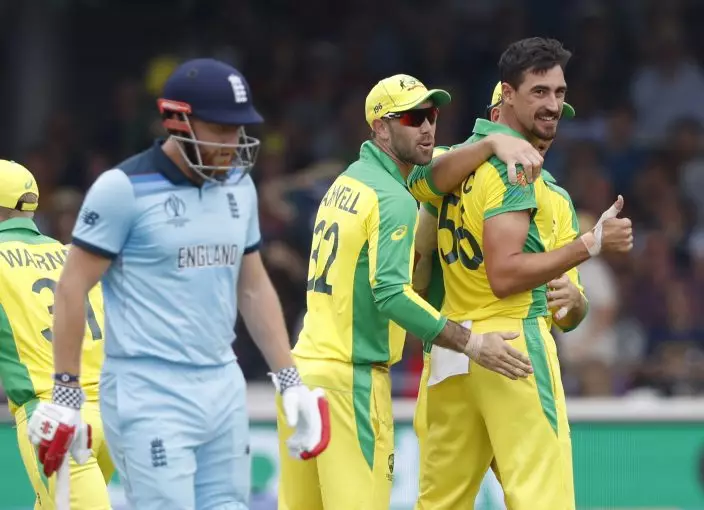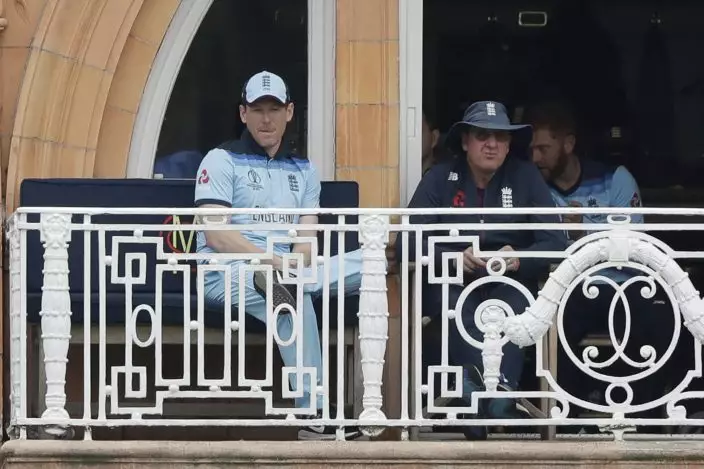The notion that the Cricket World Cup group stage could be a doddle for top-ranked England went somewhat pear-shaped with a loss to those Australians.
Or, to expand on the British idioms, England's campaign is in a spot of bother.
Cricket critics who apparently were yawning over the predictability of the tournament last week, when results were going as expected and England was firmly part of a quartet expected to reach the semifinals, are now clamoring for calculators

Former British Prime Minister David Cameron, left with TV personality and writer Stephen Fry watch the Cricket World Cup match between England and Australia at Lord's cricket ground in London, Tuesday, June 25, 2019. (AP PhotoAlastair Grant)
Consecutive losses to Sri Lanka and Australia within five days have the pre-tournament favorites needing to beat either No. 2-ranked India or 2015 runner-up New Zealand to contend for the playoffs. England hasn't beaten either of those teams at a World Cup since 1992. Compounding the degree of difficulty, India and New Zealand are unbeaten so far in the tournament.
Defending champion Australia, considered to be a shambles of a team only a few months ago, secured a semifinal spot with two games to spare following its 64-run win over England on Tuesday at Lord's, the spiritual home of cricket.
New Zealand and India are in second and third spots on the standings with 11 and nine points respectively, seemingly on the cusp of qualifying. England is in fourth place with eight points, but its recent losses bring Bangladesh (7), Sri Lanka (6) and Pakistan (5) back into play for the playoffs. West Indies (3) can't be ruled out yet, either. It leaves only South Africa and Afghanistan out of contention.

Australia's Mitchell Starc turns and give a thumbs up towards the dressing room after taking the wicket of England's captain Eoin Morgan during their Cricket World Cup match between England and Australia at Lord's cricket ground in London, Tuesday, June 25, 2019. (AP PhotoAlastair Grant)
England hadn't lost back-to-back one-day international games on home soil since 2015 leading into the World Cup, so captain Eoin Morgan isn't panicking.
"We control our own destiny, really," Morgan said, as he stood in front of a board with the live standings on it during a TV interview. "If we win the two games, we're going to be through. If we win one game, we've still a chance of going through.
"We're not reliant on other fixtures or other results — yet."

England captain Eoin Morgan, left, and England coach Trevor Bayliss sit on their team's balcony after Morgan was out for four runs during the Cricket World Cup match between England and Australia at Lord's cricket ground in London, Tuesday, June 25, 2019. (AP PhotoMatt Dunham)
Tension is certainly building ahead of the England-India game on Sunday in Birmingham, where the visiting team will have a lot of support from a large resident ex-pat population. In the meantime, here's some World Cup talking points:
OLD RIVALRY
The international cricket rivalry between England and its former colony dates back to the 1870s. The Ashes has become something of a catch-all name for contests between England and Australia since it was created in the 1880s. The Ashes got its name from a mock obituary — the death of English cricket — following England's first loss on home soil to the Australians. The story goes that wooden bails were burned and its remnants housed in the now-famous urn on England's next tour to Australia.
There's no venue on foreign soil where Australian cricketers prefer to win more than Lord's, from where the Marylebone Cricket Club long administered the sport.
And as veteran Australian broadcaster Jim Maxwell eagerly pointed out on BBC radio in his post-match analysis, Australia has won back-to-back World Cup appearances at Lord's — the previous being the 1999 final.
Since undergoing a transformation in its game plan in the wake of a group-stage exit in the 2015 World Cup, England had beaten Australia in 12 of the 14 one-day internationals the two countries had contested. Prior to that stretch, Australia had won 11 of 12 ODIs against England.
But this is the World Cup, and no team has a better record at the quadrennial tournament than Australia. Since its first triumph in 1987 in India, Australia has won the title in 1999 in England, in 2003 in South Africa, in 2007 in the Caribbean and in 2015 on home soil. It reached two other finals, losing the inaugural decider to West Indies in 1975 at Lord's and to Sri Lanka in '96.
England hasn't won the World Cup title, but has assembled an attacking squad more than capable of breaking the duck — provided all the moving parts start clicking together.
NUMBERS GAME
The quaintly named and quintessentially-cricket Duckworth-Lewis-Stern calculators used so frequently in recent weeks to work out run-rate scenarios for rain-interrupted games are being discarded for a formula a lot more plainer to understand: the semifinal tiebreakers.
If teams finish equal on points, it's the team with the most wins advancing. If teams finish with equal points and wins, the tiebreaker is net run-rate across the tournament. In the extremely unlikely event of NRRs being equal, it goes to the outcome of the head-to-head.
Australia has 12 points with two games in hand. New Zealand can retake the lead if it wins its seventh game — against Pakistan on Wednesday — and India can move to 11 in its sixth game if it beats West Indies the following day in Manchester.
Sri Lanka surged back into contention with an upset win over England last Friday and can jump Bangladesh into fifth place if it beats South Africa on Friday.
One potential hitch for Sri Lanka in terms of tiebreakers is in the win column: Sri Lanka's six points include two from each of its wins and one each from washed-out games. England's eight points come from four wins.
AHOY, ROY
The SOS calls to injured opening batter Jason Roy are escalating after England's back-to-back defeats.
Former England skipper Michael Vaughan told the BBC after England's loss to Australia, after Roy had missed three games with an injured left hamstring, the England team's medical staff may have to "wheel him out ... to win them a game potentially" against India.
Roy's replacement, James Vince, has been dismissed for 26, 14 and, against Australia, for a duck of two deliveries. It has compounded pressure on Roy's return.
England captain Eoin Morgan has consistently said since Roy tore a muscle in his upper leg while fielding in the win over West Indies on June 14 that the opener wouldn't be rushed back before he's ready.
"With four days of rehabilitation — he's hopeful of being fit," Morgan said of Roy's prospects of facing India. "But if it's a big risk, we'll play it as it is."
More AP cricket: www.apnews.com/cricket and https://twitter.com/AP_Sports


